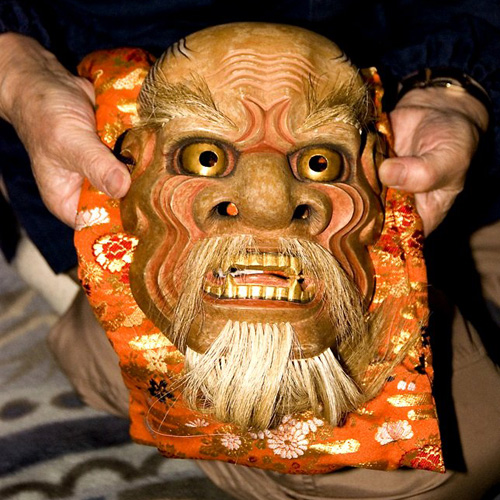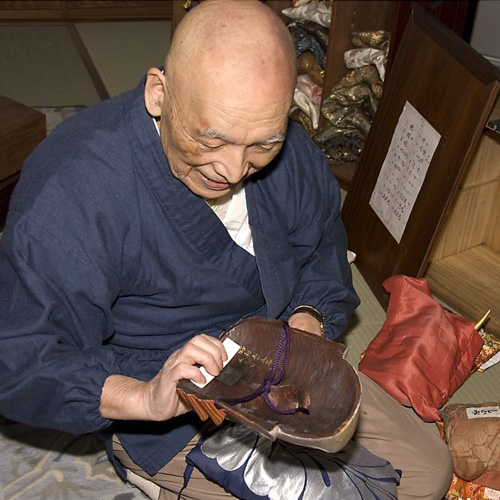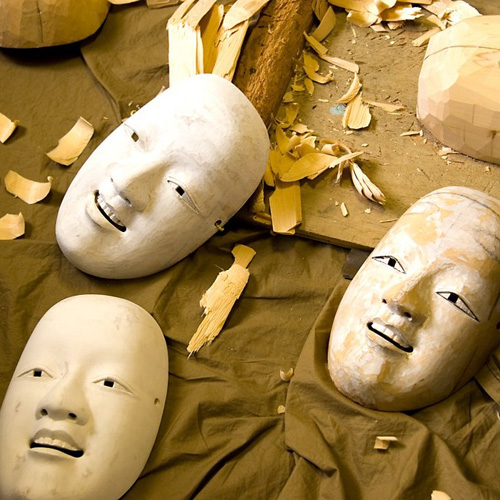
One spring day 12 years ago, while strolling through the cedar shaded grounds of 700-year old Nanzenji Zen monastery in Kyoto's eastern foothills, I passed through the arch of a red brick, Roman-style aqueduct to explore the area behind the head abbot's quarters. While looking at the vermillion, lacquered altar of a small sub-temple, an elderly priest appeared from behind me. "What are you doing here?" he asked in a no-nonsense voice.
Any gruffness I heard was immediately dispelled by one thing. The man twinkled. He was both sweet and mischievousness."Tourists rarely visit here. We have no famous garden to see." We chatted for a while, and I was about to leave when he said, "Sometimes I invite people to see the Noh masks that I carve." I gasped. A Noh mask carver! He then told me of some English letters he had received but could not understand. "I will translate them for you!" I said, almost knocking him over with my enthusiasm to come even a little closer to the rarified world of Noh.
Now, 12 years later, I am a frequent guest at Sakura-san's temple. He is 86 years old, yet his laugh, his sense of humor and the extraordinary sweetness that endeared him to me so many years ago, still welcome me like a grandfather.

Shuren Sakurai was born to a family of farmers, in rural Aichi prefecture. Life for many was very different then. "In those days, families were large and poor, and children were often adopted out. When I was nine, I entered this temple as a boy monk, and the abbot here became my master, my teacher, my parent. Though it was hard for me to be away from my real parents, in those days, we accepted the reality of what life gave us and we just did what we had to do."
"My adopted father often said to me, 'Become true gold, not gold plating. Whatever you do in your life, put your entire self into it. Make it gold." People now-a-days only want to do things that are easy and comfortable. There is nothing that can be accomplished well through short cuts. Things that matter take time and our complete attention."
When Sakurai-san graduated from school in 1945, he was drafted into the Imperial Army and sent to China. After the war, he was captured by Soviet troops and spent three years in a lumber camp in the Gulag. "We were 16 Japanese boys sleeping in a tent in a Siberian forest. We kept our feet warm next to a charcoal stove, but our heads felt completely frozen. Later when I returned to Japan, I had become so strong that I could work outside in the Kyoto winter without a shirt."
The Soviets denied that there were Japanese boys in their labor camps. Families at home assumed that they had died in action. When Sakurai-san was finally released, the war had been over for three years. He returned to the temple to find that his adopted father had since died. The temple was in disrepair and overgrown with weeds. "I needed to repair the temple. I also needed to enter the monastery and begin my training for the priesthood so I found someone to live here and rent out rooms to keep things together while I was away."
He finished his training, returned to Saisho-in, got married and had two children. There was very little income for a temple at that time. Japan's war defeat had been followed by disillusionment and secularization. During the war the temple's donation box provided much income. Women prayed for the safe return of soldier husbands or sons from abroad. After the war, many stopped coming. It was very difficult to keep up the temple and support his young family. "When my young daughters entered kindergarten, I also needed money for their tuition."
"I decided to rent out a room in the temple. A Noh mask carver showed up and took the room to use as a studio. He suggested that I also carve Noh masks and that curio shops would sell them to tourists. He also told me that my face would come out in the masks I carve. I was very taken by that. My quest as a Zen monk was to find myself. Carving masks could be a vehicle for my search.
"So I began to carve. Though the master gave me some guidance, I had to learn by myself. This craft cannot be taught. The few students that I have had always wanted me to do the difficult parts for them. But that is the very thing that they should be doing. If you put your whole self into your work, it will be good. It will be gold. It is not a matter of comparing one's work with another's."

For years, Sakurai-san just carved masks, from early morning until late at night. "It was more important to me than eating or sleeping. Anything done completely, results in transcending mind and emotions. This is the path that I had chosen. Carving is the same as sitting Zazen. I don't think it matters what you choose as your life's occupation, as long as you produce something that is real; something good; something gold. People ask me if my carving has improved over the years. I really can't answer that. Each mask is different. I approach each one as if I am carving for the first time. Work done slowly, carefully, patiently and with the open mind of a beginner will be good."
I asked him once why he so often carves the ko omote mask of a young girl. "The ko omote is the first mask that beginning carvers must master because it is the least detailed of all the masks. There is no expression of emotion." An emotionless mask allows the Noh actor wearing it to project his own emotion. As simple as it appears, this mask is actually "the one with which carvers end their careers carving, because it is the most difficult." It is the essence of purity and subtlety. Whatever unresolved toughness or harshness is in the heart of the carver will show up in the expression on the mask.

Sakurai-san has kept one of every type of mask that he has carved. "My masks are my legacy to this temple." Until five years ago, he had no apparent successor as abbot of Saisho-in. Then, his grandson, fresh out of university, entered a Zen training monastery with plans to eventually take over for his grandfather. The family is giving him the freedom to make his own decisions, without pressure. When I asked if he will also carve masks, Sensei answered,
"He hasn't said anything yet. But at least we know now that the temple's masks will be well taken care of," he said with the eyes of a monk, the smile of a grandfather, and, of course, a golden twinkle.